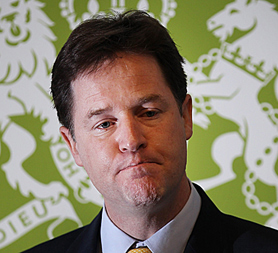Cameron meets Clegg over future of control orders
The Prime Minister has held a coalition “summit” with his Liberal Democrat deputy Nick Clegg over the future of control orders, reveals Channel 4 News Political Correspondent Cathy Newman.
David Cameron hosted a meeting with Mr Clegg and the Home Secretary, Theresa May, at Number Ten after the Lib Dem leader had signalled his continued opposition to the use of control orders for terror suspects during a speech in London.
Signalling that a deal has yet to reached between the Lib Dems and the Conservative Party, the Deputy Prime Minister said control orders – which place terror suspects under close supervision similar to house arrest – were a “very specific issue that we’ll be seeking to address”.
He added: “I don’t think it’s justifiable to impose virtual house arrest without having to charge or convict someone first.”
Mr Clegg said that government’s first duty was “to keep the British people safe”, adding that the threat from “multiple sources, not just one, is very real indeed”.
“I don’t think it’s justifiable to impose virtual house arrest without having to charge or convict someone first.” Nick Clegg
However, he said control orders applied to only a tiny number of people and were one part of a wider counter terrorism review.
“If you ask people whether they are happy with the control order regime that departs very significantly from the very basic rules of British justice and has proved to be ineffective in practice as many controlees have absconded – I think everybody will say ‘no – clearly something is wrong’. Clearly something needs to be improved,” he said.
Mrs May is said to want to retain control orders – along with the Prime Minister, who is reported to have warned her in October that the Coalition Government was “heading for a car crash” over the issue.
The Liberal Democrats had promised to scrap control orders during the election, but the Tories want to keep them to protect the public. Today Mr Clegg seemed to accept, however, that some measure was necessary in a small number of cases to protect the public.
The former Labour Home Secretary John – now Lord – Reid – told Channel 4 News that he detected a change in Mr Clegg’s position.
“I very much welcome the shift from Nick Clegg in recognising that extraordinary measures are necessary in order to protect the public – and apply to a small number of individuals – whatever they are called – whatever the exact details,” he said.
The curtailment and knowledge of people’s movements, the curtailment and knowledge of their communications, the protection of the public’s secruity and the maximising of surveillance – these are the essential elements of control orders.”
Civil liberties
But, speaking on his 44th birthday at the Institute for Government today, Mr Clegg announced plans to reverse what he called the everyday “assaults” on civil liberties which had crept in during Labour’s tenure.
Mr Clegg said the last government’s moves on civil liberties were aggressive, widespread and indiscriminate.
Noting Labour’s policies to increase surveillance, ID cards and DNA records, Mr Clegg said: “Many now feel normal, even mundane. It is in that chipping away at our freedom that the danger lies…over time it makes us less vigilant about our freedom.”
Both sides of the Coalition flagged their commitment to “reverse the substantial erosion of civil liberties under the Labour government” in the days that followed the General Election.
Mr Clegg today branded many of Labour’s anti-terror measures “disproportionate in design and ineffective in practice”.
His words came as a YouGov poll found support for the Lib Dems has plunged to just 7 per cent, its lowest level in 20 years. The survey, conducted for The Sun, puts the Conservatives on 39 per cent, with Labour four points ahead on 43 per cent.

Libel laws
Mr Clegg went on to flag up the “chilling effect” of libel laws on scientific debate and investigative journalism.
“Our aim is to turn English libel laws from an international laughing stock to an international blueprint,” he said.
“It is simply not right when academics and journalists are effectively bullied into silence by the prospect of costly legal battles with wealthy individuals and big businesses,” the Lib Dem leader added.
“Nor should foreign claimants be able to exploit these laws, bringing cases against foreign defendants here to our courts – even if the connection with England is tenuous.
“It is a farce – and an international embarrassment – that the American government has felt it necessary to legislate to protect their citizens from our libel laws.”
“It is a farce – and an international embarrassment – that the American government has felt it necessary to legislate to protect their citizens from our libel laws.” Nick Clegg
He said the Government would publish a draft Defamation Bill in the Spring, in order to restore the UK’s international reputation for free speech.
“We believe claimants should not be able to threaten claims on what are essentially trivial grounds. We are going to tackle libel tourism.
“And we’re going to look at how the law can be updated to better reflect the realities of the internet.”
Mr Clegg will also promise to “address the high costs of defamation proceedings”, with proposals to restrict controversial “no-win no-fee” arrangements.
-
Latest news
-
Fans react to football clubs increasing season ticket prices4m

-
‘We’re still a long way from justice’, says infected blood scandal victim5m

-
Infected blood scandal: Victims set to receive billions of government compensation7m

-
Iran’s president and foreign minister missing after helicopter crash3m

-
Yungblud launches his own affordable music festival5m

-




